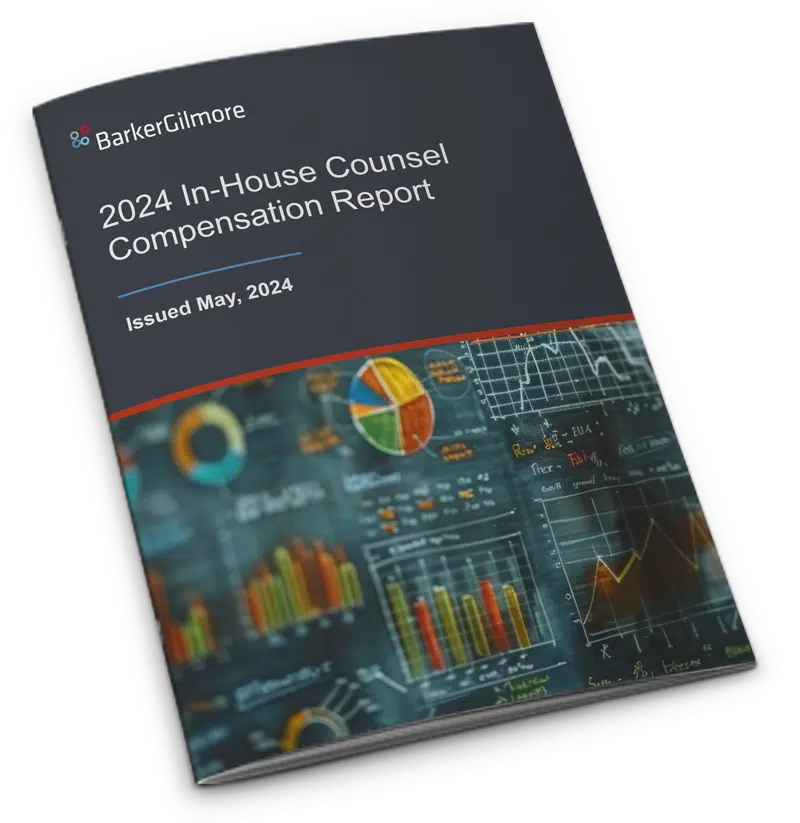To offer further insights into the trends highlighted in General Counsel Pay Trends, Equilar spoke with John Gilmore, Co-Founder and Managing Partner at BarkerGilmore. Mr. Gilmore explored the evolving role of General Counsel and the key qualities that define a successful candidate.
Beyond the Numbers
What key skills and expertise do General Counsel bring to the table that drive their value up?
Across the Equilar 500, General Counsel compensation has continued to steadily rise year over year, with many companies willing to pay a premium for top legal talent. It’s worth examining the key skills, experience and personal attributes that have the greatest impact on how companies value and compensate their General Counsel.
The key criteria related to a General Counsel’s value are not based solely on previous experience or academic credentials. Instead, it’s largely based on their ability to present themselves as an executive who understands the business, knows the numbers, appreciates the challenges involved, has a history of hiring, mentoring and motivating top talent, and can share stories to demonstrate how they helped to overcome adversity, or leveraged opportunities, to achieve success for their company.
A strong resume consisting of a prestigious law school, top law firm training and record of accomplishment of in-house leadership may get a candidate to the interview table, but what gets a CEO excited and ultimately determines value are the relevant and compelling stories told by the candidate. Whether the examples involve past commercial successes, litigation wins or regulatory victories, General Counsel candidates must be prepared to explain how their influence on a business enabled its goals to be achieved. That’s the individual who companies are willing to bet on and pay top dollar for.
If a General Counsel candidate is not a good storyteller, if their presentation is inarticulate or boring, or if there is a perceived misfit in chemistry and cultural fit, a person’s candidacy is short-lived. BarkerGilmore is currently working with a CEO who begins every interview with “walk me through your resume.” The candidates who can clearly and concisely describe their careers, supported with relevant, compelling stories in six or seven minutes, are almost always invited back for additional rounds of interviews. Meanwhile, long-winded attorneys who ramble for 20 minutes or longer and who fail to deliver a compelling message are immediately written off.
In short, General Counsel candidates must come to an interview well-prepared, have a professional presence, demonstrate the ability to influence others and provide a track record of effective business decisions. You need to impress decision makers in a confident yet humble manner. That’s how the talent premium is earned.
The AI renaissance has made its way through Corporate America, and almost every company is looking for ways to incorporate AI into their processes. What role does the General Counsel play in this era, and how crucial is it to have a legal expert on board?
It’s interesting that Gartner’s 2024 Hype Cycle for Artificial Intelligence shows that the technology has recently passed its “Peak of Inflated Expectations,” and is now heading into its “Trough of Disillusionment” phase.
We are seeing that downward trend reflected in stock prices of AI companies as well. While there is no denying the potential impact of AI on all aspects of business, most companies are taking a measured approach with respect to its adoption, which is a prudent strategy.
Over time, however, General Counsel will play a significant role in developing and enforcing AI governance frameworks. This includes setting policies for ethical AI use, ensuring compliance with applicable legal and ethical standards, and managing risks related to privacy, security, and bias.
As AI regulations evolve, General Counsel will be the primary point of contact with regulators, to ensure that the company is proactive in its compliance efforts and prepared to adapt to new regulatory requirements. General Counsel will also lead efforts to educate the organization about the legal implications of AI, which includes training employees on data privacy, Intellectual Property (IP) issues and ethical AI practices.
With respect to AI’s impact on recruitment of in-house legal professionals, the technology allows for the identification of those who may have the skillset necessary, but technology will never be able to turn a high-performing, well-compensated lawyer who is not actively seeking a new position into a viable General Counsel candidate. Those are the individuals who can tackle the most complex and sophisticated matters, and they are the candidates our clients want to hire. AI will never be able to gain their attention. AI will never be able to understand a good prospect’s personal situation, personality, and interests, or to understand what really motivates them, and bring them to the table and close on a new opportunity. Getting to the finish line with the desired outcome will always require a human touch and a lot of finesse gained through years of experience.
A Deep Dive: An Inside Look at General Counsel Pay and Tenure
Looking across the Top 20 highest-paid named executive officers (NEOs) serving as General Counsel in 2023, the total annual compensation ranges from $7 million to $27 million. Fifty percent of the Top 20 list is predominantly represented by the technology and communication services sectors, and the market caps vary from a low of $120 billion to more than $3 trillion at Apple. Keep in mind that for these top corporate executives, 80% to 90% of their earnings is deferred income in various forms of equity awards. This sizable component of the overall compensation is not realized unless the business achieves success, and when RSUs (restricted stock units) vest, options are exercised, and/or performance parameters are met, typically over a three-to-five-year horizon. Talk about golden handcuffs!
More broadly, the fact that General Counsel pay is increasing at a higher rate than CEO pay strongly suggests that CEOs are increasingly dependent on their General Counsel and are recognizing the business value that General Counsel bring to their organizations. Most CEOs consider their General Counsel as a consigliere and meet daily to discuss whatever is top of mind.
With respect to General Counsel changing organizations, the factors which most often motivate someone to consider a new opportunity include company growth, equity potential, dynamic leadership or influential board members, company reputation and/or mission, a chance to leverage current industry knowledge, or the opportunity to fix, build, or optimize a law department.
As for tenure in any position, when a General Counsel masters a business, earns trust from the enterprise as a strategic partner, and continues being challenged by new responsibilities, they tend to be content and remain committed to the long-term success of the company. While unvested equity plays a role encouraging longevity, companies are prepared to even the playing field and make an individual whole financially when luring them away. Lack of challenge, new leadership, change of company control, misaligned values or lost vision for the future can easily motivate a General Counsel to consider something new. On a personal level, family situations and other obligations can also prevent a General Counsel from considering new opportunities, but once lifted (most often after becoming empty nesters) there are many new options to be considered. Timing is everything.
There tends to be greater flexibility for the requirement of having specific industry experience within technology, consumer products, entertainment, transportation, industrial products and services, and manufacturing. CEOs of highly regulated industries such as financial services, energy and healthcare often require the General Counsel to have first-hand experience with the specific regulatory concerns, but there are always exceptions. For example, IBM recently hired Anne Robinson as CLO after a successful career with Vanguard. Then Vanguard backfilled Anne’s position by leveraging Tonya Robinson’s policy and regulatory experience coming from KPMG. 
While stress, lack of work-life balance and the vast contribution to the business warrant the high compensation received, it is difficult to find a General Counsel who does not love what they do. Most General Counsel thoroughly enjoy the continuous learning, problem-solving challenges and leadership responsibility of the position. Even those walking away from a successful General Counsel career with a considerable amount of money will reach out to me after a short break, seeking a new professional challenge. A seasoned General Counsel in this state of transition is considered a high-value candidate by most companies.
Impact of Public Company Risks and Talent Availability on Recruiting Practices
As the regulatory, geopolitical and economic risks increase, CEOs are less willing to take a chance on a step-up General Counsel, whether through an internal promotion or external hire. Most CEOs are seeking an experienced General Counsel who has “sat in that seat,” with a proven record of accomplishment internally with the executive leadership team and the board, and externally with financial analysts, shareholders, regulators, employees, customers, and vendors.
Recruiting General Counsel today can be a challenge if any of the parameters of the position are out of line with the market for talent, which can include compensation, reporting structure, law department resources, role as a strategic advisor or company reputation. Relocation can be difficult, particularly in the General Counsel world, where spouses often have high-level careers of their own. Increasingly, General Counsel are looking at opportunities through the lens of their family needs, rather than just considering the opportunity itself.
As executive search consultants, we work on behalf of our clients to understand what truly makes an opportunity attractive, to relate their company story well and get the best candidates excited to consider an opportunity. Since the most attractive candidates are least likely to be actively looking for something new, it’s our job to identify and focus on the specific conditions that appeal to them. The story around the opportunity must be more compelling than compensation.
Diversity remains a priority since many companies continue to target the General Counsel position to diversify their executive leadership team. Women continue to gain traction every year, and in 2023 held 39 of the top 100 highest-paid positions.
Seeing the pay disparity between men and women change direction does not surprise me. Over the past several years, I predicted this gap would close as more women advanced into the position. The demand for diversity in the General Counsel/CLO position has remained strong, and the cost of hiring new talent has risen.
In most cases, the compensation required to hire a charismatic, business-minded lawyer will outpace that of the outgoing General Counsel whose salary increases flattened out years ago. We have witnessed an increased number of women being internally promoted or externally recruited to serve as General Counsel over the past ten years. With increased attention to succession planning, the talent pool is outstanding.
To view the full study, download the 2024 General Counsel Compensation Report, a publication by Equilar with commentary from BarkerGilmore.
John Gilmore is co-founder and Managing Partner of BarkerGilmore with over three decades of executive search experience. John has developed trusted relationships with General Counsel and C-suite leaders across the country. He has unfettered access to the extraordinary talent they seek and an innate ability to quickly identify a substantive and cultural match. With a profound institutional understanding of how in-house legal and compliance departments function most effectively, John has earned a reputation as one of the top executive search consultants for General Counsel and Chief Compliance Officer placements.
Connect with a legal recruiting advisor
* indicates required fields







